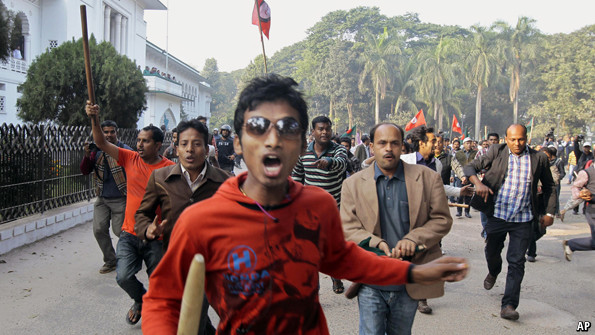
IT IS becoming hard to know whether Sheikh Hasina, Bangladesh’s prime minister, is a cynically good actress or cut off from political reality. Smiling before journalists in Dhaka, the capital, on January 6th, she chided opposition parties for their “mistake” in boycotting general elections the day before, then waved aside doubts over the legitimacy of her victory.
Either way, her country’s democracy is in a rotten state. Of a potential electorate of 92m (out of more than 150m people), only a minority turned out. The government says just under 40% voted in contested seats; others think much less. It does not give Sheikh Hasina’s Awami League (AL), which has ruled since 2009, much of a basis for another term
Many polling stations saw almost no voters, then suspiciously large numbers of ballots cast late in the day. Of the 300 constituencies, just over half, 153, had no contest at all, since only AL candidates or allies registered. In the capital voting took place in just nine of 20 seats.
The main opposition Bangladesh Nationalist Party (BNP) and a host of smaller parties refused a contest they said would be unfair unless supervised by a caretaker government of the kind seen in the previous four elections. But Sheikh Hasina scrapped the constitutional provision for that in 2011.
The BNP’s leader, Khaleda Zia, long a bitter rival to the prime minister, remains under what amounts to house arrest. Mohammad Hossain Ershad, a former dictator who leads the third-biggest party, Jatiyo, has been locked up in an army hospital since he belatedly joined the poll boycott. A fourth party, Jamaat-e-Islami, an Islamist and thuggish outfit, was banned from the polls for being too religious. On January 7th police arrested yet more opposition figures, including a close adviser to Mrs Zia as he left a meeting with journalists. Thousands of activists have been detained.
Political intimidation is officially explained away as an effort to stop the violence that has persisted since the AL claimed victory. On polling day alone, over 20 people were shot by police, or beaten or burned to death as rival goons from the BNP and the League clashed and as opposition thugs petrol-bombed buses, apparently to discourage voting. In some cases violent attacks appeared staged especially for television and other cameras.
In all, it is an ugly start to what is bound to be another bloody year. In 2013, 500 or so people were killed in political clashes, one of the most violent years since independence. The government, with some cause, blames the BNP and, especially, its Islamist allies. Since the election, pro-Jamaat hoodlums have reportedly attacked minority Hindu families in rural areas.
Yet the League also bears responsibility for the unrest. A flawed war-crimes trial, in which leading opposition figures have been sentenced to hang for what they did in the independence war of 1971, has greatly raised tensions. The trials and executions will go on for months.
It is less clear how long Sheikh Hasina believes she can brazen things out. That, a close adviser concedes, is “the trillion-dollar question”. He expects another year or more before new elections. Several factors favour her as she prepares to be sworn in at the end of the month. Not least, the BNP is in disarray, its leaders either uninspiring or locked up. Its recourse to months of crippling strikes and street protests, in association with Jamaat, was desperate and did not go down well with most Bangladeshis.
Foreigners will press for a new vote, but not firmly. Western countries all refused to send observers to the recent polls. On January 6th American, British and other governments lamented the violence and the flawed election in equal measure. Yet none has gone so far as to say that Sheikh Hasina’s victory, and thus her government, is illegitimate. Outsiders could threaten to cut aid or trade benefits (especially valuable duty-free access for clothes to the EU). But they will be wary of undermining laudable anti-poverty efforts.
So Sheikh Hasina probably thinks she can hold on. If she is seen to offer negotiations with Mrs Zia, that may be enough to buy her time. Official proposals for future elections are likely to include all-party caretaker administrations and a revamped election commission. But agreement on these would take months and may never be reached. Meanwhile the government will press the BNP hard to break ties with Jamaat.
Sheikh Hasina enjoys a degree of political cover. The biggest neighbour, India, did send observers to the polls, and praised her for holding them at all. Despite earlier Indian efforts to look even-handed, among Bangladeshis the perception is growing that India heavily favours Sheikh Hasina over her rivals. It is certainly eager to see Jamaat and other Islamists weakened.
At home, the Bangladeshi army is unlikely to repeat its futile effort in 2007 to banish both the atrocious begums, Mrs Zia and Sheikh Hasina, from politics altogether. The army made a mess of its attempt at governing, in 2007-08. Sheikh Hasina also benefits from having sweetened the armed forces with lucrative UN peacekeeping duties and promises of Russian weapons and Chinese submarines that should encourage them to remain in their barracks in the coming months.
Much depends on what sort of leadership the opposition can offer—in particular, whether it can turn its popular refusal to take part in a flawed election into a wider protest calling for new and fair polls. Once, when Mrs Zia was asked whether she believed Sheikh Hasina would step down after an election, she called her a “despot” who thinks she will “never have to relinquish power”. But even if all goes well, that prediction is likely to take months to be proven wrong.
Source: The Economist









